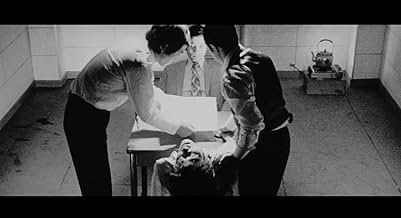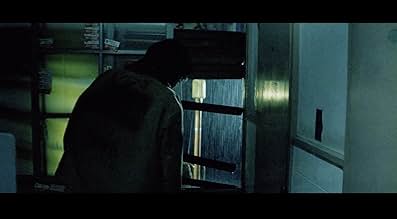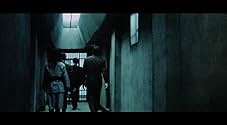IMDb रेटिंग
6.3/10
1.8 हज़ार
आपकी रेटिंग
अपनी भाषा में प्लॉट जोड़ेंOnce again on the lam, Matsu is helped by a strip club worker who holds a grudge against the detective who's trying to find her.Once again on the lam, Matsu is helped by a strip club worker who holds a grudge against the detective who's trying to find her.Once again on the lam, Matsu is helped by a strip club worker who holds a grudge against the detective who's trying to find her.
फ़ीचर्ड समीक्षाएं
More than practically every film I've seen before in my life, "Grudge Song" emphasizes the essentialness of one certain director linked to a cinematic franchise. Shunya Ito directed the first three installments of the ""Female Prisoner: Scorpion" series and they were simply phenomenal and pretty much flawless. For this fourth entry, Yasuharu Hasabe took place in the director's seat and promptly the narrative ingenuity as well as the stylish characteristics notably lowered in quality. By no means I intend to claim that "Grudge Song" is a bad film far from it, as you can derive from the rating I've given but it nearly isn't as breathtakingly awesome as the previous ones. But in all honesty, Hasabe can't be blamed entirely, as he actually just remained faithful to his own personalized style and filming methods. This man also directed uncompromising and vastly outrageous Cat-III movies with delicious sounding titles such as "Rape! The 13th Hour", "Assault: Jack the Ripper" and even "Stray Cat Rock: Sex Hunter", so you honestly can't expect this man to alter his style towards a more elegant and suggestive type of exploitation cinema. The fourth film is much sleazier and straightforward, with less likable character drawings and visually dazzling gimmicks. Hasabe obviously didn't care too much for the complexities of part three ("Beast Stable") or the deliriousness of part two ("Jailhouse 41") and returned to the gritty in-your-face mentality of the original. The script is largely a re-run of familiar themes. Nami is still a fugitive from the law and she has yet another relentless copper obsessively chasing her. She finds shelter, and even affection, in the arms of a porno theater employee who still has an old score to settle with the police. But when he get captured by the police and brutally interrogated, he betrays Nami's hideout place. Back in prison our heroine picks up her old habits of causing riots, manipulating personnel and fellow inmates and of course attempting to escape from the hangman's rope. "Grudge Song" is definitely still a good movie, far superior to the majority of contemporary exploitation movies for sure, but a weaker entry in the series. The plot only offers few surprises and Nami suddenly transformed into a genuine antagonist to the audience as well. You always sympathized with her before, but here she commits a handful of crimes that can't possibly be justified. She also talks a little more in this film, and her silence was part of her charming personality in the other installments. Talking in terms of visual decoration, "Grudge Song" is fairly mediocre with only a couple of noteworthy highlights (like the truly menacing POV-shots of the noose in the middle of the prison's yard). This film also immediately marked the end of the "official" Female Scorpion cycle. The successors, appropriately entitled NEW Female Prisoner, don't star Meiko Kaji in the title role any longer and aren't directed by any of the above-mentioned directors. I'm curious about the remaining two films (which I own in a fancy box set), but I'm keeping the expectations rather low just to be sure.
This begins well enough and has enough going on, a male helper this time, to maintain the interest until the most exciting scenes come along. It is a good idea that Meiko's seeming saviour here has had history with the police already from his days of 60s student rebellion. Flashbacks enable stand-in director Hasebe to double his violent police demonstrations with current and b/w past. This is number four in the series, however, and needed more not less in the way of interesting action and visuals. Gone are the stylish sequences and gone the surrealism. The endings, both false and actual are fun and if this is a disappointment it is no disgrace and while not the greatest of finales, probably a much better fourth episode than many might have expected. Worth seeing.
And so at last we come to the end of the great Matsu the Scorpion's bloody, weird, and incredibly thrilling saga. This is the only entry in the series not directed by Shun'ya Ito, so I was a bit nervous going into this film; I've really enjoyed all the FPS movies, and I really didn't want the final outing to fall flat on it's face.
To my great delight, this film didn't fall flat; it delivered everything I'd want from an outing with Matsu. At the same time, Matsu's story seems to be wearing a little thin; at this point in the saga she's escaped from prison with others, had her revenge, and in the last entry ("Beast Stable") she even become a kind of savior for oppressed women. In this entry, history more or less repeats itself; the storyline in "Grudge Song" is relatively the same as the first and second entries ("FPS #701" & "FPS: Jailhouse 41"), only the story is compressed into an hour and a half. If you've seen the other entries, you pretty much know what's going to happen in this entry, and while there isn't necessarily a problem (people still line up for Marvel movies, and they're all relatively homogenous), to me, the series has started to loose a bit of it's appeal, and I honestly think ending it here was probably the best choice: go out on a note that is still relatively positive, and people will be keener to return to the franchise. I, for one, will happily go through Matsu's journey multiple times in my life.
To my great delight, this film didn't fall flat; it delivered everything I'd want from an outing with Matsu. At the same time, Matsu's story seems to be wearing a little thin; at this point in the saga she's escaped from prison with others, had her revenge, and in the last entry ("Beast Stable") she even become a kind of savior for oppressed women. In this entry, history more or less repeats itself; the storyline in "Grudge Song" is relatively the same as the first and second entries ("FPS #701" & "FPS: Jailhouse 41"), only the story is compressed into an hour and a half. If you've seen the other entries, you pretty much know what's going to happen in this entry, and while there isn't necessarily a problem (people still line up for Marvel movies, and they're all relatively homogenous), to me, the series has started to loose a bit of it's appeal, and I honestly think ending it here was probably the best choice: go out on a note that is still relatively positive, and people will be keener to return to the franchise. I, for one, will happily go through Matsu's journey multiple times in my life.
After narrowly escaping brutal Detective Kodama Sasori hides out in a seedy strip joint in the back streets of Tokyo.There she encounters Kudo who was humiliated and tortured by Kodama and his cronies years ago.The two strike a bond and soon set out to exact Kudo's long dreamt-about justice against detective Kodama.But their plan is not going to end happily."Female Convict Scorpion Grudge Song" is filled with sadness and unrelenting nihilism.Yasuharu Hasebe,the creator of violent pink sub-genre directs with a sure hand and Mejko Kaji is fantastic as a relentless Sasori.She even kills a cop with a white rose.There is also sleazy gang-rape scene and plenty of nudity.If you enjoyed previous installments of "Scorpion" pinky violence series give this one a look.8 out of 10.
Nami Matsushima, the Scorpion, still on the run from Kodama, meets Yasuo. Together they try to exact revenge on the corrupt detective, but when things go awry, Nami is back in prison and has to find a way to escape before being hanged.
Meiko Kaji returned to play the title role, but director Shunya Ito was replaced by Yasuharu Hasebe (1932-2009). Hasebe was more controversial, and is best known for his movies in the "violent pink" subgenre of the Pink film, such as "Assault! Jack the Ripper" (1976), and the provocatively-titled "Rape!" (1976), "Rape! 13th Hour" (1977) and "Raping!" (1978). Take from that what you will.
Because of the change in director, some people do not consider this to be a "full" sequel in the Scorpion series, despite the lead actress returning. I have no opinion on that one way or the other.
Meiko Kaji returned to play the title role, but director Shunya Ito was replaced by Yasuharu Hasebe (1932-2009). Hasebe was more controversial, and is best known for his movies in the "violent pink" subgenre of the Pink film, such as "Assault! Jack the Ripper" (1976), and the provocatively-titled "Rape!" (1976), "Rape! 13th Hour" (1977) and "Raping!" (1978). Take from that what you will.
Because of the change in director, some people do not consider this to be a "full" sequel in the Scorpion series, despite the lead actress returning. I have no opinion on that one way or the other.
क्या आपको पता है
- कनेक्शनFeatured in Yutaka Kohira: Scorpion Old and New (2016)
टॉप पसंद
रेटिंग देने के लिए साइन-इन करें और वैयक्तिकृत सुझावों के लिए वॉचलिस्ट करें
- How long is Female Prisoner Scorpion: #701's Grudge Song?Alexa द्वारा संचालित
विवरण
- रिलीज़ की तारीख़
- कंट्री ऑफ़ ओरिजिन
- भाषा
- इस रूप में भी जाना जाता है
- Female Prisoner Scorpion: #701's Grudge Song
- उत्पादन कंपनी
- IMDbPro पर और कंपनी क्रेडिट देखें
इस पेज में योगदान दें
किसी बदलाव का सुझाव दें या अनुपलब्ध कॉन्टेंट जोड़ें

टॉप गैप
By what name was Joshû sasori: 701-gô urami-bushi (1973) officially released in India in English?
जवाब






















